| Srl | Item |
| 1 |
ID:
137507
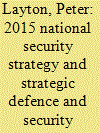

|
|
|
|
|
| Summary/Abstract |
In devising the 2015 National Security Strategy (NSS) and Strategic Defence and Security Review (SDSR), British decision-makers have a choice between trying to shape international affairs to be more favourable or instead planning to respond meaningfully to events that arise. The former grand strategic approach appears favoured however, the latter risk management approach remains the basis for work. That the two approaches are incompatible, distinctly dissimilar and would yield markedly different NSS and SDSR outcomes is generally overlooked. Moreover, opportunism, a third viable approach has been neglected. This article evaluates the three approaches, ascertains their principal advantages and weaknesses and outlines three alternative NSSs and SDSRs based on the different approaches.
|
|
|
|
|
|
|
|
|
|
|
|
|
|
|
|
| 2 |
ID:
137506
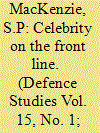

|
|
|
|
|
| Summary/Abstract |
Of the various television documentaries dealing with British military operations in Helmand Province, among the most successful have been those fronted by TV actor Ross Kemp. This article examines the development, airing and reception of the first of these, Ross Kemp in Afghanistan. The aims of the filmmakers and the needs of the Ministry of Defence and British Army are examined, along with Kemp’s time as an embedded reporter with 1 Royal Anglians in 2007, and the responses of critics, soldiers and the viewing public to resulting the series, in an effort to discern why it worked for all concerned.
|
|
|
|
|
|
|
|
|
|
|
|
|
|
|
|
| 3 |
ID:
137508
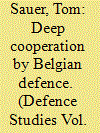

|
|
|
|
|
| Summary/Abstract |
Despite tight budgetary constraints, the number of military interventions in which Belgium participated is substantial. The Belgian air force and navy were able to retain their basic war fighting capabilities after the Cold War. The land forces lost and are losing capabilities because of a lack of strategic anchoring. The most important Belgian contribution to international and European defence thinking has to be found in the innovative approach with respect to Belgian–Dutch naval cooperation. The latter could be an example for Europeanizing and generating the use of military capabilities in order to make the EU a strategic actor in the multipolar world.
|
|
|
|
|
|
|
|
|
|
|
|
|
|
|
|
| 4 |
ID:
137509
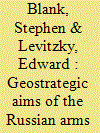

|
|
|
|
|
| Summary/Abstract |
Russia views its military exports as a major tool for achieving its national security interests, particularly, in the East Asia and the Middle East. The arms trade is an integral part of its image as a world power, a critical part of its relationship with other states in Asia, a central element in its defense and security agreements, and an essential component of its ability to obtain and maintain access to influence and resources in regions of interest. So, while it is true that Russia does sell arms and military equipment to generate revenue and extend production runs for its defense industry, it is erroneous to claim that this in the central driver behind Russia’s arms trade. Russia seeks to maintain and expand its status as a world power, and views the focused, purposeful export of its military technologies to key countries as a fundamental tool in achieving this.
|
|
|
|
|
|
|
|
|
|
|
|
|
|
|
|
| 5 |
ID:
137505
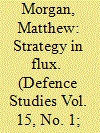

|
|
|
|
|
| Summary/Abstract |
In response to the uncertain geopolitical environment which confronted it after the end of the Cold War, NATO adopted a strategy of risk management. Two institutions – the Science and Technology Office and Allied Command Transformation – were responsible for translating this policy into practice. By promoting knowledge development, each institution sought to make NATO a more reflexive and responsive organization. Knowledge development became the foundation for a new model of command and control created by two Science and Technology Office working groups. While this model has vast potential, its implementation has been blocked by internal rifts within NATO.
|
|
|
|
|
|
|
|
|
|
|
|
|
|
|
|